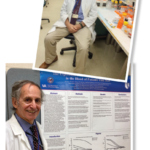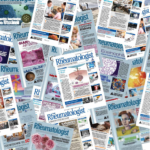“Quite simply, I don’t think we could have chosen a better first editor for our publication,” says David G. Borenstein, MD, immediate past president of the ACR, TR editorial board member, and clinical professor of medicine, division of rheumatology at The George Washington University Medical Center in Washington, D.C. “[Dr. Pisetsky] has really given this publication a personality, a character that I think was unique, in that people were looking forward to the issues as they came out.”
What Will You Do Next?
An investigator known for his pioneering work characterizing the anti-DNA antibody response in systemic lupus erythematosus, Dr. Pisetsky also discovered the existence of antibodies to bacterial DNA in the normal population; these findings led to subsequent work to identify the mitogenic activity of bacterial DNA and its potential in inducing autoimmunity.
In addition to his research background, Dr. Pisetsky brought a host of talents to the new publication. He praises the exceptional quality of the science and clinical review articles in TR, which form the core of every issue. As he approached potential contributors, Dr. Pisetsky saw an additional opportunity to render their articles more engaging. “There’s often a tendency at the end of clinical trial articles or reviews to conclude with the phrase, ‘More studies are needed,’ ” he reflects. “I encouraged the scientists and clinical investigators to write in a different way. I told them I wanted them to be personal and accessible. And I wanted them to address what they would be doing tomorrow. That was fun for me.”
Dr. Borenstein says, “The quality of those scientific articles represents some of the best available on the topic [such as the front-page article on CNS vasculitis in the September 2011 issue].” He also appreciates the practical aspects brought into the scientific articles: “I understand evidence base—I don’t want to throw that out—but I also want to know, How do you deal with these patients, and what issues do you need to think about? This is the component of those articles that make them practical to people who see patients.”

Most General of All Specialties
In article selection, Dr. Pisetsky has always strived for a broad range of subject areas. That’s because rheumatology encompasses many different specialties. “In some respects, we are generalists for a group of diseases that has been unified into a specialty, making us the most general of all specialties,” he notes. “I think part of being a rheumatologist in general is to form alliances with other specialties in a way that you can engage in a dialogue about how best to manage or study patients with complicated and often multisystem diseases. We’re very eclectic by nature.”


